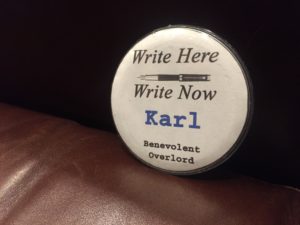
In March 2020, California decided that non-essential employees should start working remotely. You know, just for a bit, until all the fuss died down and we could all return to our cubicles.
By Feb 2021, after numerous in-person events were either canceled or migrated to online formats, I realized it was probably going to be a serious stretch before I could hang with my fellow word miners. No coffee shops, no bar-cons, no weekend workshops, and no woodsy retreats. Thank you, pandemic-enablers. Really, you shouldn’t have.
We were truly stuck inside for the duration. So, taking a page from a weekend Google Hangout group, I decided to try my luck at this whole Zoom thing. I called it “Story-breaking and kvetching” after two of my favorite group writer activities. It started out as a Saturday thing, and then an occasional Sunday thing, with the times alternating from morning to evening to accommodate folks in different time zones.
Once, last summer, I even held a late-night session from Sweden and was able to snag a guest appearance from a London friend. Score!
The number of participants varies. A few times I’ve been alone and used the time to write quietly. Once we had 10 people. Mostly, it’s a die-hard core of 3-5 folks from Viable Paradise, Paradise Lost, and CODEX. Tuesday nights and Saturday mornings. Plus the odd Thursday when I’m on deadline.
I’ve moved away from the “kvetching” aspect (although that still happens, because, writers) to focus more on a 30-minute check-in before we do 90 minutes of writing. I’m always interested in how people are surviving the Permanent Health Crisis, what are they working on, and hey, did you sell a story or finish your novel? Excellent! Virtual high fives all around.
I’ll be honest. I would much rather sit with my friends on comfy furniture with laptops and beverages than stare at this screen and chat in a side window. And that time will come again, in some form. Meanwhile, I hope people continue to show up, or stop by for the first time, and mine some words.
You are most welcome. Tuesdays and Fridays. Plus the odd Thursday.

